初中英语教材里后接动名词和不定式作宾语的动词
- 格式:doc
- 大小:46.00 KB
- 文档页数:4
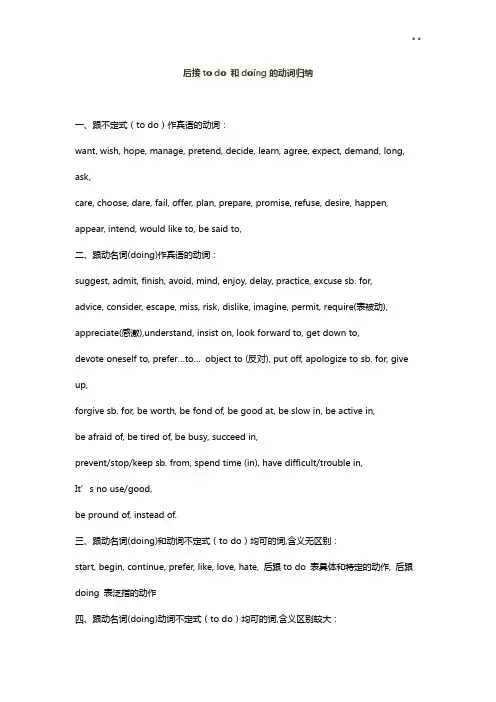
后接to do 和doing的动词归纳一、跟不定式(to do)作宾语的动词:want, wish, hope, manage, pretend, decide, learn, agree, expect, demand, long, ask,care, choose, dare, fail, offer, plan, prepare, promise, refuse, desire, happen, appear, intend, would like to, be said to,二、跟动名词(doing)作宾语的动词:suggest, admit, finish, avoid, mind, enjoy, delay, practice, excuse sb. for, advice, consider, escape, miss, risk, dislike, imagine, permit, require(表被动), appreciate(感激),understand, insist on, look forward to, get down to,devote oneself to, prefer…to…object to (反对), put off, apologize to sb. for, give up,forgive sb. for, be worth, be fond of, be good at, be slow in, be active in,be afraid of, be tired of, be busy, succeed in,prevent/stop/keep sb. from, spend time (in), have difficult/trouble in,It’s no use/good,be pround of, instead of.三、跟动名词(doing)和动词不定式(to do)均可的词,含义无区别:start, begin, continue, prefer, like, love, hate, 后跟to do 表具体和特定的动作, 后跟doing 表泛指的动作四、跟动名词(doing)动词不定式(to do)均可的词,含义区别较大:1. stop to do2. mean to do3. try to do4. agree to dostop doing mean doing try doing agree to sb doing5. be afraid to do6. remember to do7. forget to do8. allow/permit/advise sb. to dobe afraid of doing remember doing forget doing allow/permit/advise doing9. regret to do10. want to do11. need to do12. go on to doregret doing want doing (表被动) need(表被动) go on doing13. can’t help to do14. forbid sb. to do=forbid sb’s doingcan’t help doing forbid doing15.感官动词+ doing/to do感官动词see, watch, observe, notice, look at, hear, listen to, smell, taste, feel + do 表示动作的完整性,真实性;+doing 表示动作的连续性,进行性I saw him work in the garden yesterday.昨天我看见他在花园里干活了.(强调"我看见了"这个事实)I saw him working in the garden yesterday.(强调"我见他正干活"这个动作)昨天我见他正在花园里干活.典型例题1)They knew her very well. They had seen her ___ up from childhood.A. growB. grewC. was growingD. to grow答案:A.因题意为,他们看着她长大,因此强调的是成长的过程,而非正在长的动作,因此用see sb do sth 的句型.2)The missing boy was last seen ___ near the river.A. playingB. to be playingC. playD. to play答案A. 本题强调其动作,正在河边玩,应此用see sb. doing sth句型中学英语中哪些动词后加to do sth和加doing sth一、接不定式(而不接动名词)作宾语的24个常用动词afford to do sth. 负担得起做某事agree to do sth. 同意做某事arrange to do sth.安排做某事ask to do sth. 要求做某事beg to do sth. 请求做某事choose to do sth. 决定做某事decide to do sth. 决定做某事demand to do sth. 要求做某事determine to do sth. 决心做某事expect to do sth. 期待做某事fear to do sth. 害怕做某事help to do sth. 帮助做某事hope to do sth. 希望做某事learn to do sth. 学习做某事manage to do sth. 设法做某事offer to do sth. 主动提出做某事plan to do sth. 计划做某事prepare to do sth. 准备做某事pretend to do sth. 假装做某事promise to do sth. 答应做某事refuse to do sth. 拒绝做某事want to do sth. 想要做某事wish to do sth. 希望做某事注:有些不及物动词后习惯上也接不定式,不接动名词:aim to do sth. 打算做某事fail to do sth. 未能做某事happen to do sth. 碰巧做某事hesitate to do sth. 犹豫做某事struggle to do sth. 努力做某事二、接不定式作宾补的36个常用动词advise sb. to do sth. 建议某人做某事allow sb. to do sth. 允许某人做某事ask sb. to do sth.请(叫)某人做某事bear sb. to do sth.忍受某人做某事beg sb. to do sth. 请求某人做某事cause sb. to do sth. 导致某人做某事command sb. to do sth. 命令某人做某事drive sb. to do sth .驱使某人做某事elect sb. to do sth. 选举某人做某事encourage sb. to do sth. 鼓励某人做某事expect sb. to do sth. 期望某人做某事forbid sb. to do sth. 禁止某人做某事force sb. to do sth. 强迫某人做某事get sb. to do sth. 使(要)某人做某事hate sb. to do sth. 讨厌某人做某事help sb. to do sth. 帮助某人做某事intend sb. to do sth. 打算要某人做某事invite sb. to do sth. 邀请某人做某事leave sb. to do sth. 留下某人做某事like sb. to do sth. 喜欢某人做某事mean sb. to do sth. 打算要某人做某事need sb. to do sth. 需要某人做某事oblige sb. to do sth. 迫使某人做某事order sb. to do sth. 命令某人做某事permit sb. to do sth. 允许某人做某事persuade sb. to do sth. 说服某人做某事prefer sb. to do sth. 宁愿某人做某事request sb. to do sth. 要求某人做某事remind sb. to do sth. 提醒某人做某事teach sb. to do sth .教某人做某事tell sb. to do sth. 告诉某人做某事train sb. to do sth. 训练某人做某事trouble sb. to do sth. 麻烦某人做某事want sb. to do sth. 想要某人做某事warn sb. to do sth. 警告某人做某事wish sb. to do sth. 希望某人做某事注:不要受汉语意思的影响而误用以下动词句型:汉语说:“害怕某人做某事”,但英语不说fear sb. to do sth.。
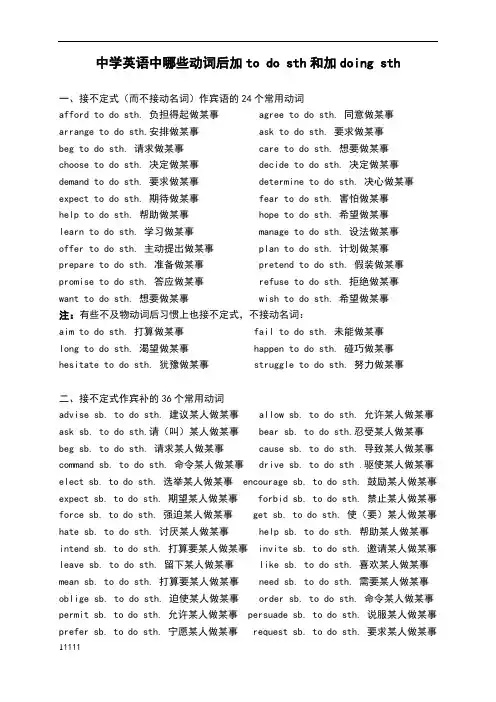
中学英语中哪些动词后加to do sth和加doing sth一、接不定式(而不接动名词)作宾语的24个常用动词afford to do sth. 负担得起做某事 agree to do sth. 同意做某事arrange to do sth.安排做某事 ask to do sth. 要求做某事beg to do sth. 请求做某事 care to do sth. 想要做某事choose to do sth. 决定做某事 decide to do sth. 决定做某事demand to do sth. 要求做某事 determine to do sth. 决心做某事expect to do sth. 期待做某事 fear to do sth. 害怕做某事help to do sth. 帮助做某事 hope to do sth. 希望做某事learn to do sth. 学习做某事 manage to do sth. 设法做某事offer to do sth. 主动提出做某事 plan to do sth. 计划做某事prepare to do sth. 准备做某事 pretend to do sth. 假装做某事promise to do sth. 答应做某事 refuse to do sth. 拒绝做某事want to do sth. 想要做某事 wish to do sth. 希望做某事注:有些不及物动词后习惯上也接不定式,不接动名词:aim to do sth. 打算做某事 fail to do sth. 未能做某事long to do sth. 渴望做某事 happen to do sth. 碰巧做某事hesitate to do sth. 犹豫做某事 struggle to do sth. 努力做某事二、接不定式作宾补的36个常用动词advise sb. to do sth. 建议某人做某事 allow sb. to do sth. 允许某人做某事ask sb. to do sth.请(叫)某人做某事 bear sb. to do sth.忍受某人做某事beg sb. to do sth. 请求某人做某事 cause sb. to do sth. 导致某人做某事command sb. to do sth. 命令某人做某事 drive sb. to do sth .驱使某人做某事elect sb. to do sth. 选举某人做某事 encourage sb. to do sth. 鼓励某人做某事expect sb. to do sth. 期望某人做某事 forbid sb. to do sth. 禁止某人做某事force sb. to do sth. 强迫某人做某事 get sb. to do sth. 使(要)某人做某事hate sb. to do sth. 讨厌某人做某事 help sb. to do sth. 帮助某人做某事intend sb. to do sth. 打算要某人做某事 invite sb. to do sth. 邀请某人做某事leave sb. to do sth. 留下某人做某事 like sb. to do sth. 喜欢某人做某事mean sb. to do sth. 打算要某人做某事 need sb. to do sth. 需要某人做某事oblige sb. to do sth. 迫使某人做某事 order sb. to do sth. 命令某人做某事permit sb. to do sth. 允许某人做某事 persuade sb. to do sth. 说服某人做某事prefer sb. to do sth. 宁愿某人做某事 request sb. to do sth. 要求某人做某事remind sb. to do sth. 提醒某人做某事 teach sb. to do sth .教某人做某事tell sb. to do sth. 告诉某人做某事 train sb. to do sth. 训练某人做某事trouble sb. to do sth. 麻烦某人做某事 want sb. to do sth. 想要某人做某事warn sb. to do sth. 警告某人做某事 wish sb. to do sth. 希望某人做某事注:不要受汉语意思的影响而误用以下动词句型:汉语说:“害怕某人做某事”,但英语不说fear sb. to do sth.。
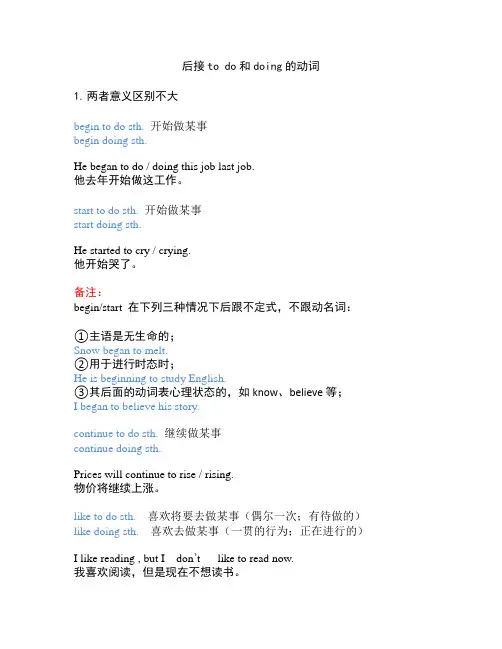
后接to do和doing的动词1.两者意义区别不大begin to do sth.开始做某事begin doing sth.He began to do / doing this job last job.他去年开始做这工作。
start to do sth.开始做某事start doing sth.He started to cry / crying.他开始哭了。
备注:begin/start 在下列三种情况下后跟不定式,不跟动名词:①主语是无生命的;Snow began to melt.②用于进行时态时;He is beginning to study English.③其后面的动词表心理状态的,如know、believe等;I began to believe his story.continue to do sth.继续做某事continue doing sth.Prices will continue to rise / rising.物价将继续上涨。
like to do sth.喜欢将要去做某事(偶尔一次;有待做的)like doing sth.喜欢去做某事(一贯的行为;正在进行的)I like reading , but I don’t like to read now.我喜欢阅读,但是现在不想读书。
2.两者意义差异较大(不定式多表达:主动、将来;动名词多表达:被动、已完成)forget to do sth.忘记要去做某事forget doing sth.忘记已经做了某事The light in the office is still on.He forgot to turn it off.办公室的等还亮着,他忘记关了。
He forgot turning the light off.他忘记他已经关掉灯了。
He forgot to pay me the money.他忘记要付给我钱。
He forgot paying me the money.他忘记付过我钱了。
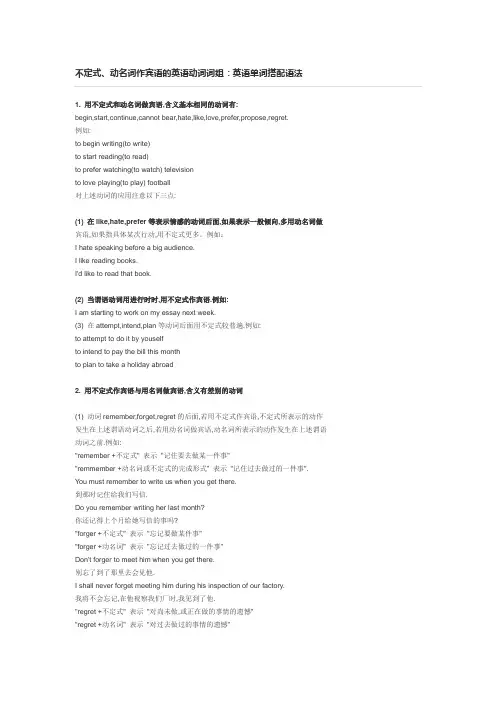
不定式、动名词作宾语的英语动词词组:英语单词搭配语法1. 用不定式和动名词做宾语,含义基本相同的动词有:begin,start,continue,cannot bear,hate,like,love,prefer,propose,regret.例如:to begin writing(to write)to start reading(to read)to prefer watching(to watch) televisionto love playing(to play) football对上述动词的应用注意以下三点:(1) 在like,hate,prefer等表示情感的动词后面,如果表示一般倾向,多用动名词做宾语,如果指具体某次行动,用不定式更多。
例如:I hate speaking before a big audience.I like reading books.I'd like to read that book.(2) 当谓语动词用进行时时,用不定式作宾语.例如:I am starting to work on my essay next week.(3) 在attempt,intend,plan等动词后面用不定式较普遍.例如:to attempt to do it by youselfto intend to pay the bill this monthto plan to take a holiday abroad2. 用不定式作宾语与用名词做宾语,含义有差别的动词(1) 动词remember,forget,regret的后面,若用不定式作宾语,不定式所表示的动作发生在上述谓语动词之后,若用动名词做宾语,动名词所表示的动作发生在上述谓语动词之前.例如:"remember +不定式" 表示"记住要去做某一件事""remmember +动名词或不定式的完成形式" 表示"记住过去做过的一件事".You must remember to write us when you get there.到那时记住给我们写信.Do you remember writing her last month?你还记得上个月给她写信的事吗?"forger +不定式" 表示"忘记要做某件事""forger +动名词" 表示"忘记过去做过的一件事"Don't forger to meet him when you get there.别忘了到了那里去会见他.I shall never forget meeting him during his inspection of our factory.我将不会忘记,在他视察我们厂时,我见到了他."regret +不定式" 表示"对尚未做,或正在做的事情的遗憾""regret +动名词" 表示"对过去做过的事情的遗憾"We regret to tell you that you can't stay here any longer.我们遗憾的通知你, 你不能再在这儿多呆了.They regretted ordering these books from abroad.向国外订购了这些书,他们很后悔.(2) 在动词try,cannot help,mean,stop,go on后,用不定式作宾语(有时是状语), 还是用动名词做宾语,其含义有明显的差别.例如:"try +不定式" 表示"设法去做某事""try +定名词" 表示"试一试某种方法""connot help +不定式" 表示"不能帮助做某事""cannot help + V-ing" 表示"禁不住""mean +不定式" 表示"打算,想要""mean +动名词" 表示"意味着,意思是""stop +不定式" 表示"停止原来做的事,开始做另一件事""stop +动名词" 表示"停止做某事""go on +不定式" 表示"放下原来做的,改做另一件事""go on + V-ing" 表示"继续做一直在做的事"。

动词后加d o i n g的归纳-标准化文件发布号:(9556-EUATWK-MWUB-WUNN-INNUL-DDQTY-KII后接to do 和doing的动词归纳一、跟不定式(to do)作宾语的动词:want, wish, hope, manage, pretend, decide, learn, agree, expect, demand, long, ask, care, choose, dare, fail, offer, plan, prepare, promise, refuse, desire, happen, appear, intend, would like to, be said to,二、跟动名词(doing)作宾语的动词:suggest, admit, finish, avoid, mind, enjoy, delay, practice, excuse sb. for,advice, consider, escape, miss, risk, dislike, imagine, permit, require(表被动), appreciate(感激),understand, insist on, look forward to, get down to,devote oneself to, prefer…to… object to (反对), put off, apologize to sb. for, give up,forgive sb. for, be worth, be fond of, be good at, be slow in, be active in,be afraid of, be tired of, be busy, succeed in,prevent/stop/keep sb. from, spend time (in), have difficult/trouble in,It’s no use/good,be pround of, instead of.三、跟动名词(doing)和动词不定式(to do)均可的词,含义无区别:start, begin, continue, prefer, like, love, hate, 后跟to do 表具体和特定的动作, 后跟 doing 表泛指的动作四、跟动名词(doing)动词不定式(to do)均可的词,含义区别较大:1. stop to do2. mean to do3. try to do4. agree to dostop doing mean doing try doing agree to sb doing5. be afraid to do6. remember to do7. forget to do8. allow/permit/advise sb. to dobe afraid of doing remember doing forget doing allow/permit/advise doing9. regret to do10. want to do11. need to do12. go on to doregret doing want doing (表被动) need(表被动) go on doing13. can’t help to do14. forbid sb. to do=forbid sb’s doingcan’t help doing forbid doing15.感官动词 + doing/to do感官动词 see, watch, observe, notice, look at, hear, listen to, smell, taste, feel + do 表示动作的完整性,真实性;+doing 表示动作的连续性,进行性I saw him work in the garden yesterday.昨天我看见他在花园里干活了.(强调"我看见了"这个事实)I saw him working in the garden yesterday.(强调"我见他正干活"这个动作)昨天我见他正在花园里干活.典型例题1)They knew her very well. They had seen her ___ up from childhood.A. growB. grewC. was growingD. to grow答案:A.因题意为,他们看着她长大,因此强调的是成长的过程,而非正在长的动作,因此用see sb do sth 的句型.2)The missing boy was last seen ___ near the river.A. playingB. to be playingC. playD. to play答案A. 本题强调其动作,正在河边玩,应此用see sb. doing sth句型中学英语中哪些动词后加to do sth和加doing sth 一、接不定式(而不接动名词)作宾语的24个常用动词afford to do sth. 负担得起做某事agree to do sth. 同意做某事arrange to do sth.安排做某事ask to do sth. 要求做某事beg to do sth. 请求做某事care to do sth. 想要做某事choose to do sth. 决定做某事decide to do sth. 决定做某事demand to do sth. 要求做某事determine to do sth. 决心做某事expect to do sth. 期待做某事fear to do sth. 害怕做某事help to do sth. 帮助做某事hope to do sth. 希望做某事learn to do sth. 学习做某事manage to do sth. 设法做某事offer to do sth. 主动提出做某事plan to do sth. 计划做某事prepare to do sth. 准备做某事pretend to do sth. 假装做某事promise to do sth. 答应做某事refuse to do sth. 拒绝做某事want to do sth. 想要做某事wish to do sth. 希望做某事注:有些不及物动词后习惯上也接不定式,不接动名词:aim to do sth. 打算做某事fail to do sth. 未能做某事long to do sth. 渴望做某事happen to do sth. 碰巧做某事hesitate to do sth. 犹豫做某事struggle to do sth. 努力做某事二、接不定式作宾补的36个常用动词advise sb. to do sth. 建议某人做某事allow sb. to do sth. 允许某人做某事ask sb. to do sth.请(叫)某人做某事bear sb. to do sth.忍受某人做某事beg sb. to do sth. 请求某人做某事cause sb. to do sth. 导致某人做某事command sb. to do sth. 命令某人做某事drive sb. to do sth .驱使某人做某事elect sb. to do sth. 选举某人做某事encourage sb. to do sth. 鼓励某人做某事expect sb. to do sth. 期望某人做某事forbid sb. to do sth. 禁止某人做某事force sb. to do sth. 强迫某人做某事get sb. to do sth. 使(要)某人做某事hate sb. to do sth. 讨厌某人做某事help sb. to do sth. 帮助某人做某事intend sb. to do sth. 打算要某人做某事invite sb. to do sth. 邀请某人做某事leave sb. to do sth. 留下某人做某事like sb. to do sth. 喜欢某人做某事mean sb. to do sth. 打算要某人做某事need sb. to do sth. 需要某人做某事oblige sb. to do sth. 迫使某人做某事order sb. to do sth. 命令某人做某事permit sb. to do sth. 允许某人做某事persuade sb. to do sth. 说服某人做某事prefer sb. to do sth. 宁愿某人做某事request sb. to do sth. 要求某人做某事remind sb. to do sth. 提醒某人做某事teach sb. to do sth .教某人做某事tell sb. to do sth. 告诉某人做某事train sb. to do sth. 训练某人做某事trouble sb. to do sth. 麻烦某人做某事want sb. to do sth. 想要某人做某事warn sb. to do sth. 警告某人做某事wish sb. to do sth. 希望某人做某事注:不要受汉语意思的影响而误用以下动词句型:汉语说:“害怕某人做某事”,但英语不说fear sb. to do sth.。
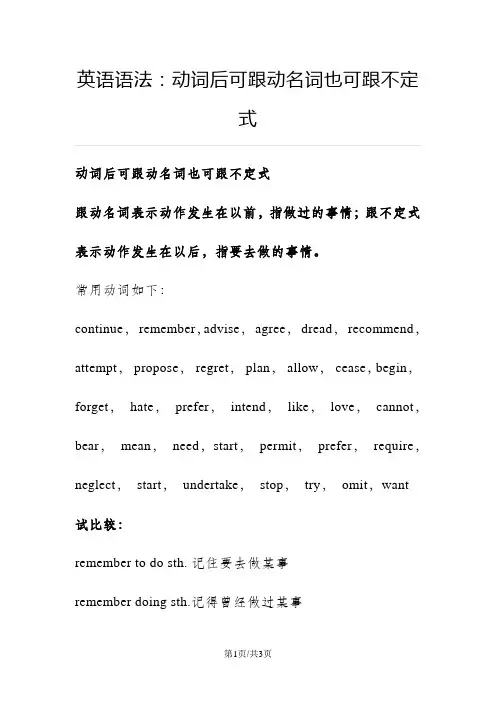
英语语法:动词后可跟动名词也可跟不定动词后可跟动名词也可跟不定式跟动名词表示动作发生在以前,指做过的事情;跟不定式表示动作发生在以后,指要去做的事情。
常用动词如下:continue,remember,advise,agree,dread,recommend,attempt,propose,regret,plan,allow,cease,begin,forget,hate,prefer,intend,like,love,cannot,bear,mean,need,start,permit,prefer,require,neglect,start,undertake,stop,try,omit,want 试比较:remember to do sth. 记住要去做某事remember doing sth.记得曾经做过某事forget todo sth.忘记要去做某事forget doing sth.忘记曾做过某事stop to do sth. 停下某事去做……stop doing sth. 停止做某事go on to do sth.(做完某事)接着做另一件事go on doing sth.继续做某事regret to do sth. 对未来行为表示遗憾regret doing sth. 对已发生的行为表示后悔try to do sth.尽力做某事try doing sth. (做某事)试试propose todo sth. 打算做某事propose doing sth. 建议做某事一、单项选择。
3.___ from a distance things appear rather small.A. SeeingB. SeeingC. SeenD. To see4.___ from the space,the Great Wall looks like a dragon.A. Having seenB. SeeingC. SeenD. To see参考答案:3-4:BC二、分析句子的英语语法结构,并翻译成中文Donald Trump has dismissed concerns about the widely condemned human rights record of the North Korean dictator,Kim Jong-un,praising him as a “tough guy”,a “smart guy”and a “great negotiator”.【The Guardian】。

初中英语动词不定式和动名词做宾语用法总结-CAL-FENGHAI.-(YICAI)-Company One1动词不定式和动名词做宾语用法总结一、下列动词后跟 to do 作宾语补足语advise sb to do sth 建议某人做某事 get sb to do sth 使某人做某事allow sb to do sth 允许某人做某事 remind sb to do sth 提醒某人做某事ask sb to do sth 请求某人做某事 invite sb to do sth 邀请某人做某事request sb to do sth 要求某人做某事 intend sb to do sth 打算要某人做某事prefer sb to do sth 宁愿某人做某事 teach sb to do sth 教某人做某事tell sb to do sth 告诉某人做某事 train sb to do sth 训练某人做某事like sb to do sth 喜欢某人做某事 encourage sb to do sth 鼓励某人做某事mean sb to do sth 想要某人做某事 expect sb to do sth 期待某人做某事order sb to do sth 命令某人做某事 want sb to do sth 想要某人做某事permit sb to do sth 允许某人做某事 warn sb to do sth 警告某人做某事force sb to do sth 强迫某人做某事 wish sb to do sth 希望某人做某事use sth to do sth 使用某事做某事 forbid sb to do sth 禁止某人做某事command sb to do sth 命令某人做某事 help sb(to) do sth 帮助某人做某事 beg sb to do sth 乞求某人做某事 cause sb to do sth 引起/导致某人做某事persuade sb to do sth 劝说某人做某事 trouble sb to do sth 麻烦某人做某事hate sb to do sth 讨厌某人做某事 drive sb to do sth 驱使某人做某事二、下列动词后跟 to do 做宾语help to do sth 帮助做某事 hope to do sth 希望做某事ask to do sth 要求做某事 refuse to do sth 拒绝做某事decide to do sth 决定做某事 promise to do sth 承诺做某事wish to do sth 希望做某事 pretend to do sth 假装做某事expect to do sth 期待做某事 arrange to do sth 安排做某事learn to do sth 学习做某事 plan to do sth 计划/打算做某事demand to do sth 命令做某事 dare to do sth 胆敢做某事manege to do sth 设法完成某事 agree to do sth 同意做某事prepare to do sth 准备做某事 fail to do sth 未能做成某事determine to do sth 下定决心做某事 offer to do sth 主动提出做某事choose to do sth 选择做某事 desire to do sth 愿望做某事elect to do sth 选举做某事 would like to do sth 想要做某事afford to do sth 负担得起做某事 used to do sth 过去常常做某事beg to do sth 乞求做某事 fear to do sth 害怕做某事be afraid to do sth 害怕做某事 make an effort to do sth 尽力做某事be supposed to do sth 应该做某事 = be expected to do sth 被期待做某事make an effort to do sth 尽力做某事 like/love to do sth 喜欢做某事be ready to do sth 准备做某事;愿意做某事be sure to do sth 确保做某事 be willing to do sth 愿意做某事start/begin to do sth 开始做某事 can’t wait to do sth 迫不及待做某事happen to do sth 碰巧做某事三、下列动词或动词短语后跟doing做宾语四、下列动词后跟doing和to do 意思不同1.Remember to do sth 记得去做某事Remember doing sth 记得做过某事2.Forget to do sth 忘记去做某事Forget doing sth 忘记做过某事3.Regret to do sth 很遗憾要做某事(对现在要做的事)Regret doing sth 后悔做了某事(事情已发生)4.Stop to do sth 停下来去做另一件事Stop doing sth 停止做某事5.Mean to do sth 打算,想要做某事Mean doing sth 意思是,意味着6.Try to do sth 设法做某事,尽力做某事Try doing sth 尝试做某事7.Go on to do sth 接着做不同的事与continue 的用法相同 Go on doing sth 接着做同一件事8.Can’t help doing sth 情不自禁做某事Can’t help to do sth 不能帮助做某事。
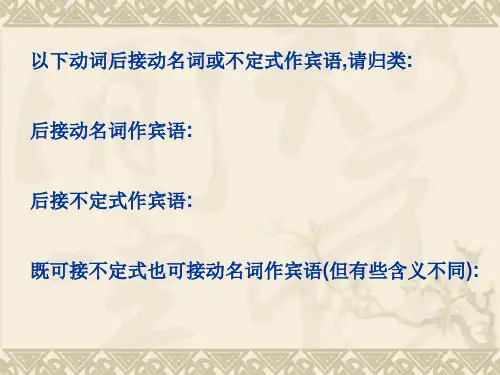
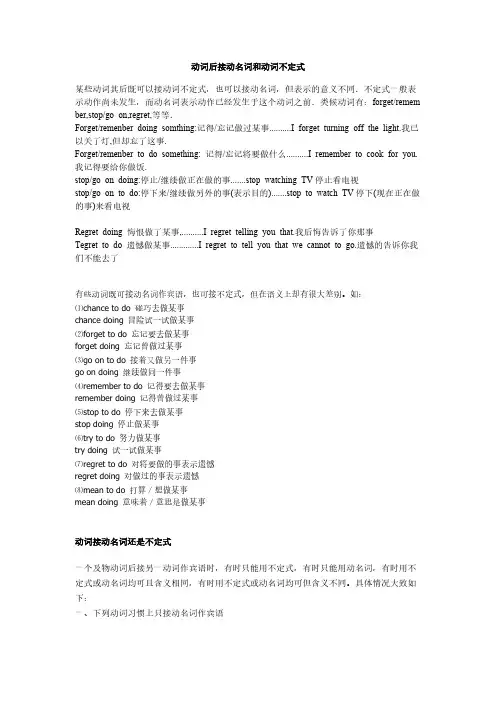
动词后接动名词和动词不定式某些动词其后既可以接动词不定式,也可以接动名词,但表示的意义不同.不定式一般表示动作尚未发生,而动名词表示动作已经发生于这个动词之前.类候动词有:forget/remem ber,stop/go on,regret,等等.Forget/remenber doing somthing:记得/忘记做过某事..........I forget turning off the light.我已以关了灯,但却忘了这事.Forget/remenber to do something: 记得/忘记将要做什么..........I remember to cook for you.我记得要给你做饭.stop/go on doing:停止/继续做正在做的事.......stop watching TV停止看电视stop/go on to do:停下来/继续做另外的事(表示目的).......stop to watch TV停下(现在正在做的事)来看电视Regret doing 悔恨做了某事,..........I regret telling you that.我后悔告诉了你那事Tegret to do 遗憾做某事.............I regret to tell you that we cannot to go.遗憾的告诉你我们不能去了有些动词既可接动名词作宾语,也可接不定式,但在语义上却有很大差别。
如:⑴chance to do 碰巧去做某事chance doing 冒险试一试做某事⑵forget to do 忘记要去做某事forget doing 忘记曾做过某事⑶go on to do 接着又做另一件事go on doing 继续做同一件事⑷remember to do 记得要去做某事remember doing 记得曾做过某事⑸stop to do 停下来去做某事stop doing 停止做某事⑹try to do 努力做某事try doing 试一试做某事⑺regret to do 对将要做的事表示遗憾regret doing 对做过的事表示遗憾⑻mean to do 打算/想做某事mean doing 意味着/意思是做某事动词接动名词还是不定式一个及物动词后接另一动词作宾语时,有时只能用不定式,有时只能用动名词,有时用不定式或动名词均可且含义相同,有时用不定式或动名词均可但含义不同。
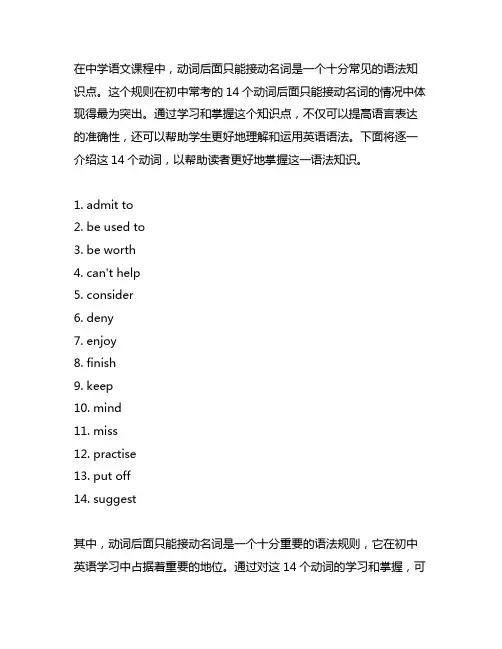
在中学语文课程中,动词后面只能接动名词是一个十分常见的语法知识点。
这个规则在初中常考的14个动词后面只能接动名词的情况中体现得最为突出。
通过学习和掌握这个知识点,不仅可以提高语言表达的准确性,还可以帮助学生更好地理解和运用英语语法。
下面将逐一介绍这14个动词,以帮助读者更好地掌握这一语法知识。
1. admit to2. be used to3. be worth4. can't help5. consider6. deny7. enjoy8. finish9. keep10. mind11. miss12. practise13. put off14. suggest其中,动词后面只能接动名词是一个十分重要的语法规则,它在初中英语学习中占据着重要的地位。
通过对这14个动词的学习和掌握,可以帮助学生更好地运用这一语法知识,提高语言表达的准确性和流利度。
对于中文母语的学生来说,这些动词后面只能接动名词的情况也常常与中文的表达方式不同,需要花费一些时间去适应和掌握。
在学习动词后面只能接动名词的情况时,我们需要注重在实际语境中的运用。
通过大量的练习和反复的操练,可以帮助学生更好地掌握这一语法知识。
老师在教学中也可以通过丰富多样的教学活动和游戏,来帮助学生更好地理解和运用这一知识点。
动词后面只能接动名词的初中常考14个动词,是一个学习英语语法时需要重点掌握的知识点。
通过对这些动词的学习和练习,可以帮助学生提高语言表达的准确性和流利度,更好地理解和运用这一语法规则。
对于中文母语的学生来说,需要花费一定的时间去适应和掌握这一规则,但通过持之以恒的努力,一定能够取得显著的进步。
希望通过本文的介绍和分析,读者能够更深入地理解和掌握这一知识点,从而在英语学习中取得更大的进步。
也希望能够激发读者对英语学习的兴趣,让英语学习成为一件有趣并且有意义的事情。
在学习动词后面只能接动名词的情况时,我们需要注重实际语境中的运用。
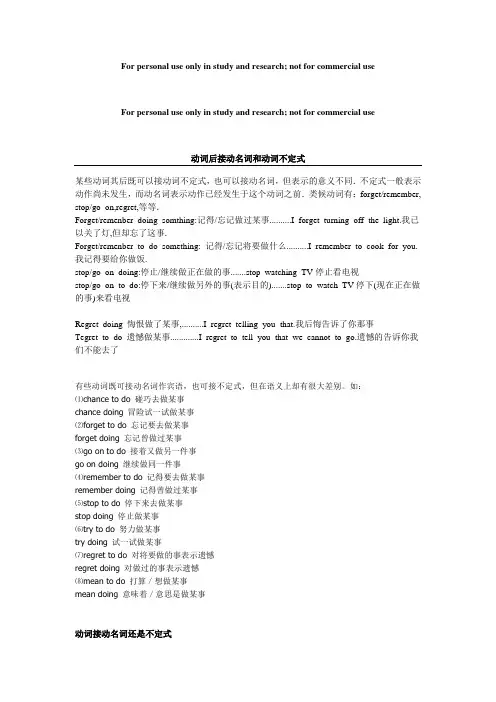
For personal use only in study and research; not for commercial useFor personal use only in study and research; not for commercial use动词后接动名词和动词不定式某些动词其后既可以接动词不定式,也可以接动名词,但表示的意义不同.不定式一般表示动作尚未发生,而动名词表示动作已经发生于这个动词之前.类候动词有:forget/remember, stop/go on,regret,等等.Forget/remenber doing somthing:记得/忘记做过某事..........I forget turning off the light.我已以关了灯,但却忘了这事.Forget/remenber to do something: 记得/忘记将要做什么..........I remember to cook for you.我记得要给你做饭.stop/go on doing:停止/继续做正在做的事.......stop watching TV停止看电视stop/go on to do:停下来/继续做另外的事(表示目的).......stop to watch TV停下(现在正在做的事)来看电视Regret doing 悔恨做了某事,..........I regret telling you that.我后悔告诉了你那事Tegret to do 遗憾做某事.............I regret to tell you that we cannot to go.遗憾的告诉你我们不能去了有些动词既可接动名词作宾语,也可接不定式,但在语义上却有很大差别。
如:⑴chance to do 碰巧去做某事chance doing 冒险试一试做某事⑵forget to do 忘记要去做某事forget doing 忘记曾做过某事⑶go on to do 接着又做另一件事go on doing 继续做同一件事⑷remember to do 记得要去做某事remember doing 记得曾做过某事⑸stop to do 停下来去做某事stop doing 停止做某事⑹try to do 努力做某事try doing 试一试做某事⑺regret to do 对将要做的事表示遗憾regret doing 对做过的事表示遗憾⑻mean to do 打算/想做某事mean doing 意味着/意思是做某事动词接动名词还是不定式一个及物动词后接另一动词作宾语时,有时只能用不定式,有时只能用动名词,有时用不定式或动名词均可且含义相同,有时用不定式或动名词均可但含义不同。
初中英语知识归纳动词的不定式和动名词动词的不定式和动名词是英语语法中的两个重要概念。
它们在句子中可以充当主语、宾语、表语、定语等成分,具有多种用法和结构。
本文将系统归纳动词的不定式和动名词的基本用法,并探讨它们在句子中的常见应用。
一、不定式的基本结构不定式是动词的一种形式,包括to + 动词原形,如to eat, to sleep等。
不定式具有以下基本结构:1. 动词不定式作主语:- To learn English is important.- Swimming is my favorite sport.2. 动词不定式作宾语:- I want to visit Paris.- She loves to read books.3. 动词不定式作表语:- My dream is to become a doctor.- The most important thing is to be yourself.4. 动词不定式作定语:- I have a book to read.- We need a place to live.二、动词不定式的常见用法1. 表示目的和意图:- I study hard to pass the exam.- He exercises regularly to stay healthy.2. 接在情态动词后,表示推测、推理:- He must be asleep.- They may have left already.3. 与一些动词连用,构成特定短语或习惯搭配:- Try to do something.- Want to do something.- Need to do something.4. 与某些动词连用,构成复合宾语:- I saw him leave the room.- She heard the baby cry.三、动名词的基本结构动名词是动词的一种形式,在句中作名词用。
后接to do 和doing的动词归纳一、跟不定式(to do)作宾语的动词:want, wish, hope, manage, pretend, decide, learn, agree, expect, demand, long, ask,care, choose, dare, fail, offer, plan, prepare, promise, refuse, desire, happen, appear, intend, would like to, be said to,二、跟动名词(doing)作宾语的动词:suggest, admit, finish, avoid, mind, enjoy, delay, practice, excuse sb. for, advice, consider, escape, miss, risk, dislike, imagine, permit, require(表被动),appreciate(感激),understand, insist on, look forward to, get down to,devote oneself to, prefer…to… object to (反对), put off, apologize tosb. for, give up,forgive sb. for, be worth, be fond of, be good at, be slow in, be active in, be afraid of, be tired of, be busy, succeed in,prevent/stop/keep sb. from, spend time (in), have difficult/trouble in,It’s no use/good,be pround of, instead of.三、跟动名词(doing)和动词不定式(to do)均可的词,含义无区别:start, begin, continue, prefer, like, love, hate, 后跟to do 表具体和特定的动作, 后跟 doing 表泛指的动作四、跟动名词(doing)动词不定式(to do)均可的词,含义区别较大:1. stop to do2. mean to do3. try to do4. agree to dostop doing mean doing try doing agree to sb doing5. be afraid to do6. remember to do7. forget to do8. allow/permit/advise sb. to dobe afraid of doing remember doing forget doing allow/permit/advise doing9. regret to do10. want to do11. need to do12. go on to doregret doing want doing (表被动) need(表被动) go on doing13. can’t help to do14. forbid sb. to do=forbid sb’s doingcan’t help doing forbid doing15.感官动词 + doing/to do感官动词 see, watch, observe, notice, look at, hear, listen to, smell, taste, feel + do 表示动作的完整性,真实性;+doing 表示动作的连续性,进行性I saw him work in the garden yesterday.昨天我看见他在花园里干活了.(强调"我看见了"这个事实)I saw him working in the garden yesterday.(强调"我见他正干活"这个动作)昨天我见他正在花园里干活.典型例题1)They knew her very well. They had seen her ___ up from childhood.A. growB. grewC. was growingD. to grow答案:A.因题意为,他们看着她长大,因此强调的是成长的过程,而非正在长的动作,因此用see sb do sth 的句型.2)The missing boy was last seen ___ near the river.A. playingB. to be playingC. playD. to play答案A. 本题强调其动作,正在河边玩,应此用see sb. doing sth句型中学英语中哪些动词后加to do sth和加doing sth一、接不定式(而不接动名词)作宾语的24个常用动词afford to do sth. 负担得起做某事agree to do sth. 同意做某事arrange to do sth.安排做某事ask to do sth. 要求做某事beg to do sth. 请求做某事care to do sth. 想要做某事choose to do sth. 决定做某事decide to do sth. 决定做某事demand to do sth. 要求做某事determine to do sth. 决心做某事expect to do sth. 期待做某事fear to do sth. 害怕做某事help to do sth. 帮助做某事hope to do sth. 希望做某事learn to do sth. 学习做某事manage to do sth. 设法做某事offer to do sth. 主动提出做某事plan to do sth. 计划做某事prepare to do sth. 准备做某事pretend to do sth. 假装做某事promise to do sth. 答应做某事refuse to do sth. 拒绝做某事want to do sth. 想要做某事wish to do sth. 希望做某事注:有些不及物动词后习惯上也接不定式,不接动名词:aim to do sth. 打算做某事fail to do sth. 未能做某事long to do sth. 渴望做某事happen to do sth. 碰巧做某事hesitate to do sth. 犹豫做某事struggle to do sth. 努力做某事二、接不定式作宾补的36个常用动词advise sb. to do sth. 建议某人做某事allow sb. to do sth. 允许某人做某事ask sb. to do sth.请(叫)某人做某事bear sb. to do sth.忍受某人做某事beg sb. to do sth. 请求某人做某事cause sb. to do sth. 导致某人做某事command sb. to do sth. 命令某人做某事drive sb. to do sth .驱使某人做某事elect sb. to do sth. 选举某人做某事encourage sb. to do sth. 鼓励某人做某事expect sb. to do sth. 期望某人做某事forbid sb. to do sth. 禁止某人做某事force sb. to do sth. 强迫某人做某事get sb. to do sth. 使(要)某人做某事hate sb. to do sth. 讨厌某人做某事help sb. to do sth. 帮助某人做某事intend sb. to do sth. 打算要某人做某事invite sb. to do sth. 邀请某人做某事leave sb. to do sth. 留下某人做某事like sb. to do sth. 喜欢某人做某事mean sb. to do sth. 打算要某人做某事need sb. to do sth. 需要某人做某事oblige sb. to do sth. 迫使某人做某事order sb. to do sth. 命令某人做某事permit sb. to do sth. 允许某人做某事persuade sb. to do sth. 说服某人做某事prefer sb. to do sth. 宁愿某人做某事request sb. to do sth. 要求某人做某事remind sb. to do sth. 提醒某人做某事teach sb. to do sth .教某人做某事tell sb. to do sth. 告诉某人做某事train sb. to do sth. 训练某人做某事trouble sb. to do sth. 麻烦某人做某事want sb. to do sth. 想要某人做某事warn sb. to do sth. 警告某人做某事wish sb. to do sth. 希望某人做某事注:不要受汉语意思的影响而误用以下动词句型:汉语说:“害怕某人做某事”,但英语不说fear sb. to do sth.。
初中英语教材里后接动名词和不定式作宾语的动词 一、有些动词只能接不定式做宾语。例如: help,hope,ask,refuse,decide,promise,wish,pretend,expect,learn,plan,manage,agree,fail,offer,happen,seem等等。例如: He refused to speak on the radio. 二、有些动词或短语只接动名词做宾语: mind,finish,enjoy,suggest,consider,miss,keep(on),avoid避开,躲开,stand(忍受),allow ,practice give up,put off,look forward to期待,期望,feel like想要做某事,prevent…from,阻止can't help禁不住,不由自主 迫不及待,be/get used to ,be worth doing,be busy doing 例如: His wife doesn't allow smoking inside the room and often advised him to give up smoking. I'm looking forward to hearing from you soon. She doesn't feel like eating anything,being ill for a few days. 三、有些动词后面既可接不定式,又可接动名词,其意义基本相同,区别不大。如;like, love,hate,prefer. begin,start. 注意:begin和start本身为进行时,或后面动词为心理变化意义的动词时,须接不定式。 例如:When we came in, they were beginning to have supper. After his explanation, I began to understand it / realize that I was wrong. 四、有些词后面既可以接不定式.亦可接动名词,但其意义有很大区别,须特别注意: A.remember,forget,接动名词,表示完成意义(=having done),接不定式,表示将来意义: 例如:Please remember to bring me the book I want next time. I remember seeing her (=having seen her) somewhere before. B.mean:mean to do=want to do打算,想要……;mean doing:意味着,就是 例如:I am sorry, I didn't mean to hurt your feelings, Learning a foreign language doesn't mean just working in class. C.stop:stop to do停下来,要干另一件事,不定式作目的状语;stop doing停止 干……,动名词作宾语。例如: After some time, they stopped walking and had a rest. After walking some time, they stopped to have a rest. D.try:try to do,努力,试图干……事;try doing:试着干……事。 例如:He searched everywhere and tried to find his key. He came to the city from the countryside and tried to find a job. E.want,need,require接动名词表示被动意义,表示"需要、该……";接不定式,表示" 想,要干……"。 例如:The room wants cleaning. The matter needs thinking over.(=to be thought over) F.go on:go on to do继续干和原来不同的另一件事,不定式作目的状语。go on doing继续干原来同一件事,动名词作宾语。例如: After a smoke,he went on telling us that interesting story. After writing his English composition he went on to work out his maths problems. G.动词advise,allow,permit,forbid后面接单宾语时用动名词,接复合宾语时 用动词不定式。例如:Doctors advise giving up smoking to benefit one's health. The doctor advised him to give up smoking so as to improve his health. She doesn't allow (permit) smoking in her room.=She doesn't allow (permit)anyone to smoke in her room.
大家都知道在动词不定式to do中,“to”是不定式的标志,有了这个to,后面所跟的动词该用原形。但是to也有可以省略的时候,这个时候虽然没有了to,后面所跟的动词依然用原形。今天的每日一课就给大家总结一些省略to的动词不定式。 1、 情态动词 ( 除ought 外) 后的to已省略。 例:You must go to the hospital first. 你必须先去医院。 I can swim well. 我能游得很好。 2、 使役动词 let, have, make后,感官动词 see, watch, look at, notice , observe, hear, listen to, smell, feel, find 等词后的to省略。 例:He made the baby crying all night long. 他让那个婴儿哭了一整夜。 Let it be. 就这样吧。 when I passed by, I saw the girl picking the flowers. 我经过的时候,看见那个女孩在摘花。 注意:在这些词的用法中,用于被动语态时不能省去to。 例:I saw him dance. 我看见他跳舞。 =He was seen to dance. The boss made them work the whole night. 老板让他们整夜干活。 =They were made to work the whole night. 3、 would rather/had better 后的to省略。 例:I would rather go to Japan than the USA.我宁愿去日本也不想去美国。 You had better take a hat with you.你最好带上一顶帽子。 4、 why…/why not…句型中not后to省略。 例:why not come to my home for a dinner tonight? 今晚何不来我家吃顿饭。 5、 help 后可带to,也可不带to, help sb (to) do sth: 6、 but和except后。but前是实义动词do时,后面出现的不定式不带to。 比较:He wants to do nothing but go out. 他只想出去玩。 He wants to believe anything but to take the medicine. 除了吃这药,他什么都信。
7、 由and, or和than连接的两个不定式,第二个to 可以省去: 例:He forgot to go to her home and give her the important letter. 他忘了去她家并把一封重要的信件给她。
第一类 remember, forget, regret:remember(记得),forget(忘记),regret(后悔)后接不定式表示动作尚未发生,后接动名词(可用一般式或完成式)表示动作已经发生。比较: Remember to post the letters. 记得把这些信寄掉。 I remember posting the letters. 我记得这些信是寄掉了的。 I forgot to tell him the news. 我忘告诉他这消息了。 I forgot telling her the news. 我忘了曾告诉过她这个消息。 She never regretted doing this. 她从没后悔这样做过。 I regret to tell you that he can’t come. 很抱歉他不能来。 第二类 go on:其后接不定式表示接着做另一事,接动名词表示接着做同样的事或不停地做着同样的事。如:
Go on to do the other exercises after you have finished this one. 做完这个练习后, 请接着做其它的练习。 You oughtn’t to go on living this way. 你不应该再这样生活下去了。 She nodded, smiled, and went on stitching. 她点了点头,笑了笑,又继续缝衣服。
注:go on后接的doing也可视为现在分词而非动名词。 第3类 can’t help:其后接动名词表示情不自禁地去做某事,接不定式表示不能帮忙去做某事。如: He couldn’t help crying when he heard the news. 他听到这个消息时禁不住哭了。 I can’t help to clean the place up. 我不能帮助打扫这地方。 1. 用不定式和动名词做宾语,含义基本相同的动词有: begin,start,continue,cannot bear,hate,like,love,prefer,propose,regret. 例如: to begin writing(to write) to start reading(to read) to prefer watching(to watch) television to love playing(to play) football 对上述动词的应用注意以下三点: